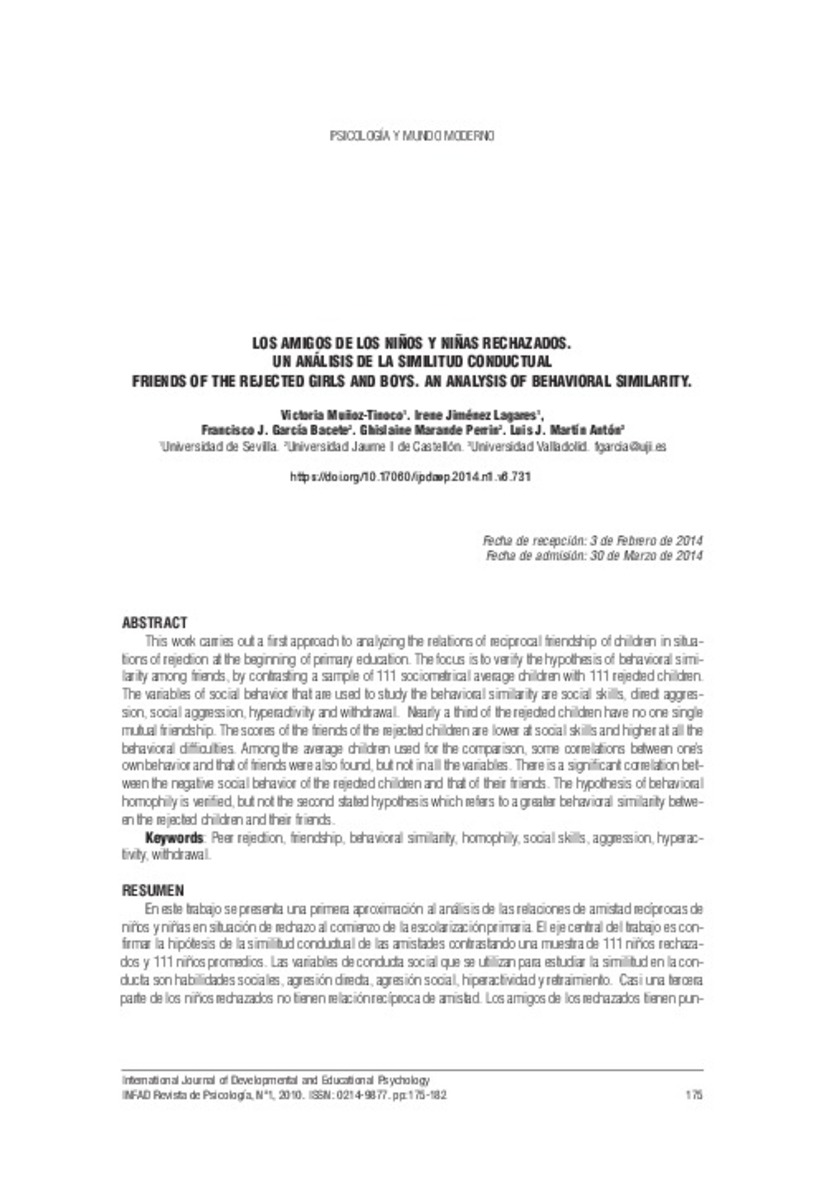Mostrar el registro sencillo del ítem
Los amigos de los niños y niñas rechazados. Un análisis de la similitud conductual
| dc.contributor.author | Muñoz-Tinoco, Victoria | |
| dc.contributor.author | Jiménez Lagares, Irene | |
| dc.contributor.author | García Bacete, Francisco Juan | |
| dc.contributor.author | Marande Perrin, Ghislaine | |
| dc.contributor.author | Martín-Antón, Luis J. | |
| dc.date.accessioned | 2017-11-17T12:40:20Z | |
| dc.date.available | 2017-11-17T12:40:20Z | |
| dc.date.issued | 2014 | |
| dc.identifier.citation | Muñoz, V., Jiménez, I., García Bacete, F.J., Marande, G. y Martín, L.J. (2014). Los amigos de los niños y niñas rechazados. Un análisis de la similitud conductual [Friends of the rejected girls and boys. An analysis of behavioral similarity]. International Journal of Developmental and Educational Psychology // INFAD Revista de Psicología 1(6), 111-118 | ca_CA |
| dc.identifier.uri | http://hdl.handle.net/10234/170190 | |
| dc.description.abstract | This work carries out a first approach to analyzing the relations of reciprocal friendship of children in situations of rejection at the beginning of primary education. The focus is to verify the hypothesis of behavioral similarity among friends, by contrasting a sample of 111 sociometrical average children with 111 rejected children. The variables of social behavior that are used to study the behavioral similarity are social skills, direct aggression, social aggression, hyperactivity and withdrawal. Nearly a third of the rejected children have no one single mutual friendship. The scores of the friends of the rejected children are lower at social skills and higher at all the behavioral difficulties. Among the average children used for the comparison, some correlations between one’s own behavior and that of friends were also found, but not in all the variables. There is a significant correlation between the negative social behavior of the rejected children and that of their friends. The hypothesis of behavioral homophily is verified, but not the second stated hypothesis which refers to a greater behavioral similarity between the rejected children and their friends. | ca_CA |
| dc.description.abstract | En este trabajo se presenta una primera aproximación al análisis de las relaciones de amistad recíprocas de niños y niñas en situación de rechazo al comienzo de la escolarización primaria. El eje central del trabajo es confirmar la hipótesis de la similitud conductual de las amistades contrastando una muestra de 111 niños rechazados y 111 niños promedios. Las variables de conducta social que se utilizan para estudiar la similitud en la conducta son habilidades sociales, agresión directa, agresión social, hiperactividad y retraimiento. Casi una tercera parte de los niños rechazados no tienen relación recíproca de amistad. Los amigos de los rechazados tienen puntuaciones más bajas en habilidades sociales y más altas en todas las dificultades conductuales. Entre los promedios de contraste también se encuentra relación entre la propia conducta y la de los amigos, aunque no para todas las variables. Existe una relación significativa entre la conducta social negativa de los niños y niñas rechazados y sus amigos. La hipótesis de la homofilia conductual se confirma, no así la segunda hipótesis formulada que hace referencia a una mayor similitud conductual entre los rechazados y sus amigos. | ca_CA |
| dc.format.extent | 8 p. | ca_CA |
| dc.format.mimetype | application/msword | ca_CA |
| dc.language.iso | spa | ca_CA |
| dc.publisher | Asociación INFAD | ca_CA |
| dc.rights | Copyright (c) 2014 Los autores | ca_CA |
| dc.rights | Atribución 4.0 Internacional | * |
| dc.rights.uri | http://creativecommons.org/licenses/by-sa/4.0/ | * |
| dc.subject | peer rejection | ca_CA |
| dc.subject | friendship | ca_CA |
| dc.subject | behavioral similarity | ca_CA |
| dc.subject | homophily | ca_CA |
| dc.subject | social skills | ca_CA |
| dc.subject | aggression | ca_CA |
| dc.subject | hyperactivity | ca_CA |
| dc.subject | withdrawal | ca_CA |
| dc.subject | rechazo entre iguales | ca_CA |
| dc.subject | amistad | ca_CA |
| dc.subject | similitud conductual | ca_CA |
| dc.subject | homofilia | ca_CA |
| dc.subject | habilidades sociales | ca_CA |
| dc.subject | agresión | ca_CA |
| dc.subject | hiperactividad | ca_CA |
| dc.subject | retraimiento | ca_CA |
| dc.title | Los amigos de los niños y niñas rechazados. Un análisis de la similitud conductual | ca_CA |
| dc.type | info:eu-repo/semantics/article | ca_CA |
| dc.identifier.doi | https://doi.org/10.17060/ijodaep.2014.n1.v6.731 | |
| dc.relation.projectID | Ministerio de Economía y Competitividad (EDU2012-35930) ; Universitat Jaume I, Plan de Promoción de la Investigación (P1-1A2012-04). | ca_CA |
| dc.rights.accessRights | info:eu-repo/semantics/openAccess | ca_CA |
| dc.relation.publisherVersion | http://www.infad.eu/RevistaINFAD/OJS/index.php/IJODAEP/article/view/731 | ca_CA |
| dc.type.version | info:eu-repo/semantics/publishedVersion | ca_CA |
Ficheros en el ítem
Este ítem aparece en la(s) siguiente(s) colección(ones)
-
PSI_Articles [592]
Articles de publicacions periòdiques








